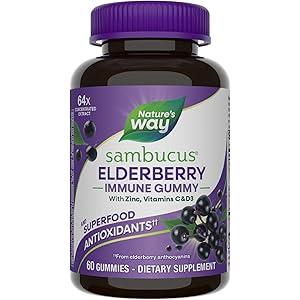Nature’s Way Sambucus Elderberry Immune Support Gummies for Kids & Adults* with Black Elderberry Extract, Vitamin C, Vitamin D3, and Zinc, 60 Gummies (Packaging May Vary)
$12.38 (as of December 8, 2025 16:22 GMT +00:00 - More infoProduct prices and availability are accurate as of the date/time indicated and are subject to change. Any price and availability information displayed on [relevant Amazon Site(s), as applicable] at the time of purchase will apply to the purchase of this product.)What is Vitamin D3?
Vitamin D3, also known as cholecalciferol, is a fat-soluble vitamin that plays a crucial role in maintaining overall health. It is one of the two main forms of vitamin D, the other being vitamin D2 (ergocalciferol). Vitamin D3 is synthesized in the skin when exposed to sunlight, specifically ultraviolet B (UVB) rays. This unique ability to produce vitamin D3 naturally makes it an essential nutrient for individuals, especially those who may not get enough sun exposure.
Sources of Vitamin D3
Vitamin D3 can be obtained from various sources, including sunlight, food, and supplements. Natural food sources rich in vitamin D3 include fatty fish like salmon and mackerel, fish liver oils, egg yolks, and fortified foods such as milk and cereals. For those who struggle to get adequate sunlight or dietary intake, vitamin D3 supplements are widely available and can help maintain optimal levels in the body.
Health Benefits of Vitamin D3
The health benefits of vitamin D3 are extensive and well-documented. It is essential for calcium absorption, which is vital for maintaining strong bones and teeth. Adequate levels of vitamin D3 can help prevent conditions such as osteoporosis and rickets. Additionally, research suggests that vitamin D3 may play a role in supporting immune function, reducing inflammation, and even improving mood and mental health.
Vitamin D3 Deficiency
Vitamin D3 deficiency is a common issue that can lead to various health problems. Symptoms of deficiency may include fatigue, muscle weakness, and bone pain. Long-term deficiency can result in serious conditions such as osteomalacia in adults and rickets in children. Certain populations, including the elderly, individuals with darker skin, and those living in northern latitudes, are at a higher risk of vitamin D3 deficiency due to limited sun exposure.
Recommended Daily Allowance (RDA) for Vitamin D3
The Recommended Daily Allowance (RDA) for vitamin D3 varies by age, sex, and life stage. For most adults, the RDA is 600 to 800 IU (International Units) per day. However, some health experts suggest higher doses, especially for individuals with low blood levels of vitamin D3. It’s essential to consult with a healthcare provider to determine the appropriate dosage based on individual needs and health status.
Vitamin D3 and Bone Health
Vitamin D3 is critical for bone health due to its role in calcium metabolism. It helps the body absorb calcium from the diet, which is necessary for maintaining bone density and strength. Insufficient vitamin D3 levels can lead to decreased calcium absorption, resulting in weakened bones and an increased risk of fractures. Ensuring adequate vitamin D3 intake is vital for individuals of all ages, particularly those at risk of osteoporosis.
Vitamin D3 and Immune Function
Emerging research indicates that vitamin D3 may play a significant role in supporting immune function. It has been shown to enhance the pathogen-fighting effects of monocytes and macrophages, white blood cells that are crucial for the immune response. Adequate levels of vitamin D3 may help reduce the risk of infections and autoimmune diseases, making it an important nutrient for overall health and wellness.
Vitamin D3 Supplementation
Vitamin D3 supplementation is often recommended for individuals who are unable to meet their vitamin D needs through sunlight and diet alone. Supplements come in various forms, including capsules, soft gels, and liquid drops. When choosing a vitamin D3 supplement, it is essential to consider factors such as dosage, quality, and any additional ingredients. Consulting with a healthcare professional can help determine the best supplementation strategy for individual health needs.
Potential Risks of Excess Vitamin D3
While vitamin D3 is essential for health, excessive intake can lead to toxicity, known as hypervitaminosis D. This condition can result in elevated calcium levels in the blood, leading to symptoms such as nausea, vomiting, weakness, and kidney damage. It is crucial to adhere to recommended dosages and consult with a healthcare provider before starting high-dose vitamin D3 supplements to avoid potential risks.
Conclusion on Vitamin D3
Vitamin D3 is a vital nutrient that supports numerous bodily functions, from bone health to immune function. Understanding its sources, benefits, and potential risks is essential for maintaining optimal health. Whether through sunlight, diet, or supplementation, ensuring adequate vitamin D3 levels is crucial for overall well-being.


